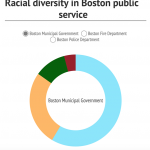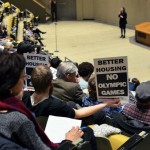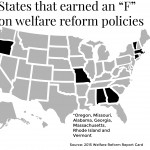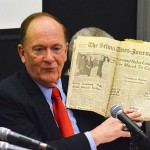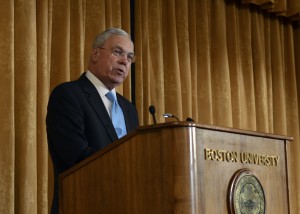
After 20 years in office, former Boston Mayor Thomas Menino accepted a position at Boston University in November 2013 with the Initiative on Cities, a project created to bring political leaders together with academics in the hope of addressing urban issues. The former mayor, who joined the BU community in February, said his semester is off to a strong start.
Almost eight months after he began his role as co-director of the IoC, Menino said in a phone call Monday that he is enjoying spending time with students and faculty. Though diagnosed with an advanced form of cancer in March, the longtime urban leader said he is feeling good.
Stephanie Pagones: How is the beginning of your semester?
Thomas Menino: “It’s good so far. No one is throwing eggs or protesting me yet.”
SP: Are you enjoying your time here?
TM: “There are good people here, and I’ve been working with all of the different faculty. You have a great president here, who really is committed to the education of the students, and at what better academic climate than Boston University?”
SP: What is your favorite part of being on BU’s campus and how has it been so far?
TM: “Campus is very exciting for me. Meeting all these students who have got great potential and learning from them and also helping them with some of the issues that they might be involved in … I really enjoy that part of it, helping the students. These four years are the most important years of their lives as far as where they’re going to go the rest of their lives. I give my advice and consent, and I disagree at times with them, but I really have good conversation with them. I have a lot of good conversations.”
SP: You held a Pizza and Politics talk on Sept. 17. Is that something that you’d like to do more of?
TM: “I really enjoyed that because I got a good sense of what the students are thinking about and how you have to work with them and what you can learn from them. Sometimes, we’re in our own little worlds, and when you open up your eyes to all these students from diverse backgrounds, educations that are very different, different nationalities, you learn a lot from them. It’s more or less a holistic approach to things. You never know what questions they’re going to ask you, which I like the best.”
SP: How are you feeling, and how are you doing now that your career is not as consuming as being the mayor of Boston?
TM: “I feel good. I’m battling cancer, but I feel really good. It’s not holding me back. I come to the office every day, and I do my work. I just don’t do 18-hour days working anymore. I do six, seven or eight hour workdays. Also, I have a book coming out in October. The name of it is “Mayor for a New America.” It’s about my 20 years of mayor of the City of Boston. It’s a good story, and I hope people will appreciate it. It comes out Oct. 14.”
SP: Please briefly explain your role at the IoC.
TM: “At the Initiative on Cities, what we’re trying to do is help mayors do a better job running their cities. We’ve had a couple conferences already this year. I first got here on the marathon bombing, and [we work with] NIH [National Institutes of Health] grants, money that comes into the city for scientific research to help combat some of these diseases we have in our world. We had the mayor of Rome [Ignazio Marino] in one day. Last week, we had Arne Duncan, who is the [United States] Secretary of Education. We are also working with Northeastern [University]. We have a mutual agreement working on early childhood programs, which is something I’m very interested in because these kids need a good start before they get into school. You just can’t put them in a classroom and say, ‘Now you’re going to learn.’ How do you nurture them to get to pre-kindergarten?”
SP: What inspired you to become a part of the BU community at the IoC?
TM: “I always worked with Boston University in my job as mayor. For 20 years, I saw how engaged they were with the city of Boston itself. They gave a lot back to the city. I said, ‘This is where I want to be – a university that understands urban issues and helps out the urban areas.’ There’s the School of Public Health…you’ve got some great people over there, and the School of Management…all those schools are fine schools. I’ve worked with them in the past, and I want to work with them in the future. BU is there in their thought process. They come up with solutions to some of the problems we have in cities throughout the world.”
SP: What have you brought from your career as mayor to your new position at the IoC?
TM: “I have some experience, a little know-how, [on] how to deal with some of these issues, and I can reach out to people who want to help us with this … I came to BU to help them educate and to work with them on some of the difficult issues of today. It’s a different world today than it was five years ago, [or] a year ago. It’s always changing. How do you continue to change, and how do you bring people in to help you? You can’t do any job alone. You have to reach out to people and have them give you advice and make you do a better job on your own.”
SP: What are your future plans and what do you hope to accomplish at the IoC, as well as while you are here at BU?
TM: “My future plans are right here, at the Initiative on Cities trying to make better cities around the world. That’s my goal: to try to help some cities. Being a former mayor, I dealt with very complex issues, from running the schools, to police department, fire department, how you balance a budget … those are big issues that a lot of cities run into problems with. I want to help them, because when I was mayor, the City of Boston was able to do a very fine job managing finances, and I want to try to help mayors do the same thing.”

